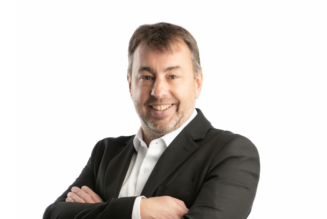At a time when the whole world has been forced to make drastic changes to the way in which it operates, one has to wonder whether being at the helm of any organisation is an enviable position.
As the cumulative effects of South Africa’s recent economic downturn and current world events make themselves felt, the ability to adapt to new models of working has been the fundamental driver of maintaining operations.
Canon South Africa MD, David Preston, has been working from his home country in England when lockdown took effect, and when asked what challenges he’s had to overcome in the wake of the lockdown restrictions, being abroad is first on the list.
However, he is quick to add that this has proved more of a mental challenge than anything else because, practically, it’s been a matter of using technological platforms such as Skype, Microsoft Teams and so on, to keep operations running.
/* custom css */
.tdi_3_300.td-a-rec-img{ text-align: left; }.tdi_3_300.td-a-rec-img img{ margin: 0 auto 0 0; }
“By ensuring that we’ve got regular communications with everybody, regular meetings with the management team and regular updates on what’s going on in the business, it doesn’t really matter what part of the world I’m operating from – we can make things work,” says Preston.
Transitioning to mobile working
For a great many businesses, changing over to a remote working culture has been a big step, with much uncertainty around whether or not it could become a workable long-term solution. But in the three months that have since passed, there seems to have been a fairly broad acceptance that certain industries could, in fact, survive quite well in this fashion.
Some have found that the transition was fairly easy and that their businesses are quite well suited to mobile working.
According to Preston, one of the key factors that contributed to Canon SA’s ability to adapt within a matter of days to the lockdown protocols was the fact that, upon Preston having taken on the role of MD in South Africa in January, the company had already begun to reinforce their business continuity plan.
So, when the reality of the global situation kicked in, it was a matter of getting all-hands-on-deck and ensuring that everybody was set up with access to the necessary equipment, internet access and data speed with which to operate.
“Practically, the initial shock and scramble to ensure that everybody was able to work independently from home was quite a hurdle, but I’m really impressed with the way that all of our employees have picked up the challenge and in most cases, if not all, have really adapted quite well.”
Empowering the organisation
Preston believes in empowering people to take responsibility for the roles they have to play in the organisation – an approach which seems to dovetail neatly with the demands of the current situation.
“I’m very much an advocate of giving people the ability and responsibility to make decisions; making sure that they have the appropriate tools, training and information to make those decisions. It’s about collaborative working, people sharing information across departments and maintaining good communication – following up and staying in touch and on top of things, especially now,” he says.
Naturally, as we have come to learn from our collective lockdown experience, maintaining a sound and productive workforce requires more than the ability to provide the practical resources that people need with which to keep working. It has also become clear that there is a profound emotional impact associated with the social limits placed on people in these circumstances.
“These days, there are none of the casual interactions you would normally have with your colleagues in the office. Every call is a meeting, every message is related to work, and this can be a very isolating experience.”
“Also, what seems to happen a lot of the time is that you start working early in the morning and, before you know it, it’s five o’ clock in the afternoon and you haven’t gotten up from your desk or had more than a cup of coffee all day. People need to be careful of that,” says Preston.
Steering towards growth with care
In terms of the business and potential opportunities that have arisen from recent events, Preston says that the SOHO (Small Office/Home Office) market has definitely seen a huge boost in sales. This is, of course, due to the number of people who have had to set up work-from-home offices, and parents having to take over their children’s schooling at home, driving huge demand for printers and related consumables
However, while this jump in sales is very welcome, Preston points out that, once the market has more or less settled into what many are calling the “new normal”, it remains to be seen whether this rise in printer sales will maintain its momentum.
Preston feels quite strongly that, in addition to ensuring that operations continue as smoothly as possible, the wellbeing of employees needs to be taken into consideration in the present circumstances.
“It’s not just about ‘How are you doing at your job? Have you got the tools you need? Are you able to log on? Have you got data?’ It’s also about ‘How are you feeling?’ – the emotional intelligence side of management – you know, ensuring that people understand that we care about their welfare.”
Preston says that, in the return to work scenario, it’s also important to understand what people’s concerns and fears are and to address those concerns and let people understand that the company will do all that it can to ensure a safe return to work.
“We’re in a situation now where the economy is going to be under a huge amount of stress for the foreseeable future, and we need to make sure that people feel comfortable to be able to talk to us about how they’re feeling about returning to work, and not burying those feeling for fear that it will jeopardise their jobs. I think there are a lot of people who are currently fearful – not particularly in our company, but in general – about the future of their positions, given the economic climate,” he says.
Meanwhile, as speculation grows with regard to what the so-called “new normal” will ultimately look like, Preston adds, “I caveat the concept of ‘Working from home is the new normal’ with a word of caution: Changing people’s behaviour is one of the hardest things in the world; We’ve got generations and generations of knowledge, experience and infrastructure which are all built around the office environment; If we’re to change all of that now, how will companies build a sense of culture going forward?”
Preston believes that organisations are going to have to strike a balance between mobile working (working from different locations, as opposed to working purely from home) and working in an office. And with this shift, he also believes that there will be a growing need for developing new ways of measuring output.
And in closing, as the panic of recent months begins to die down and different industry sectors become active again, Preston anticipates that there will be a gradual change in organisational cultures and societal behaviours with regard to remote working.










